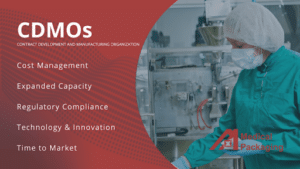What is a CDMO & How are They Revolutionizing the Pharmaceutical Industry?
“A CDMO (Contract Development and Manufacturing Organization) is a company that provides comprehensive services from drug development through drug manufacturing for pharmaceutical and biotech firms. They are revolutionizing the pharma industry by streamlining the drug development and manufacturing process, enabling faster, more efficient, and cost-effective production of pharmaceutical products.”
Collaborating closely with clients to bring their pharmaceutical products to market, CDMOs offer technical expertise in areas such as:
- Drug formulation
- Analytical development
- Regulatory support
- Quality control
A CDMO plays a crucial role in the lifecycle of a product, offering both development and manufacturing services. Unlike a CMO (Contract Manufacturing Organization), which focuses solely on large-scale production, a CDMO supports clients from the initial stages of product development through to commercial manufacturing. This comprehensive approach helps streamline the process, reduce costs, and ensure quality control throughout the entire development and production cycle. These drug development projects can range from small-scale clinical trials to large-scale commercial manufacturing.
Challenges CDMOs Help Solve

Partnering with a CDMO can help pharma/biotech companies in many ways. A full-service CDMO has access to well-qualified:
- Chemists
- Engineers
- Development specialists
- Experienced researchers
- And staff to manage the manufacturing process from start to finish
This can help clients outsource their processes and avoid all the resources, commitment, and costs associated with drug development, manufacturing, and distribution. Here are some of the key challenges a CDMO can help solve:
Problem: Cost Management
Solution: Developing and manufacturing in the pharmaceutical market can be expensive. CDMOs can help their clients manage costs by leveraging their expertise and economies of scale to optimize processes and reduce waste.
Problem: Capacity Constraints
Solution: Many pharmaceutical companies may not have the internal capacity to manufacture new products at scale. CDMOs can help by providing the capacity needed to meet demand.
Problem: Regulatory Compliance
Solution: The pharmaceutical industry is highly regulated, and companies must comply with a range of requirements related to quality, safety, and efficacy. CDMOs can help ensure that their clients’ products meet these requirements by providing expertise in regulatory compliance and quality control.
Problem: Technology & Innovation
Solution: The pharmaceutical industry is constantly evolving, and companies must stay up to date with the latest technologies and innovations. CDMOs can help by providing access to innovative technologies and expertise in the latest trends and innovations in clinical development and manufacturing.
Problem: Speed to Market
Solution: Developing and manufacturing pharmaceutical products can be a lengthy process. CDMOs can help their clients accelerate time to market by leveraging their experience and equipment to optimize processes and streamline development, manufacturing, and approval timelines.
Breaking Down a CDMO’s Services

As mentioned, a CDMO can play a variety of distinct roles in the pharmaceutical industry. Each offering is aimed at getting a biopharmaceutical or pharmaceutical product on the market in a timely manner and at a lower cost.
Drug Development & Drug Discovery
The drug development timeline can vary widely (around 6-10 years) depending on the specific drug candidate, the scope of the project, and various regulatory requirements but CDMOs can often expedite certain phases through their specialized expertise and resources.
- A CDMO will begin by conducting extensive research on the target drug candidate to establish its safety profile and identify potential safety concerns or issues that need to be addressed.
- Once a drug candidate has been selected for further development, a CDMO will begin formulation development for the drug. This involves optimizing the drug’s physical and chemical properties, such as solubility, stability, and bioavailability, to ensure that it can be safely delivered to patients.
- Then, a CDMO will also perform analytical testing to ensure the quality and consistency of the drug product.
- The next big step is likely clinical trials, which involve testing the safety and efficacy of the drug in humans.
- Finally, once the drug has successfully completed the clinical stages and received regulatory approval, the CDMO can begin commercial manufacturing of the drug product for distribution to patients.
CDMO Manufacturing Services
Like the development phase, the manufacturing step is a lengthy process that will depend on the complexity of the drug substance, capacity, and United States regulatory agencies. CDMO manufacturing can involve a range of activities including:
- Planning
- Raw materials sourcing
- Manufacturing
- Quality control
- Packaging and labeling
- Distribution
Packaging in CDMO Processes
The packaging process is an important part of a CDMO’s offerings as it ensures the final drug product is safe, effective, and compliant. With the right equipment, tracking, materials, and labeling solutions in place, a CDMO can optimize pharmaceutical or biopharmaceutical packaging to offer more efficiency.
Primary Packaging:
Outlining the primary packaging is a key first step. These can range from bottles to vials, syringes, or blister packs, all of which must be compatible with the drug product and meet regulatory requirements.
Labeling:
After the primary package and equipment are identified, the labeling must be integrated into the packaging process. These labels can include a variety of information, including:
- Name
- Indications and usage
- Dosage and administration
- Contraindications
- Warnings and precautions
- Drug interactions
- Storage and handling
- Expiration date
- Manufacturer information
- And more depending on the specific drug and intended use
If necessary, the drug product may also be packaged into secondary packaging, such as cartons, boxes, pouches, and trays, and additional labeling or instructions are added as required.
Once packaged and labeled, the drug product is stored in appropriate conditions and transported and distributed according to regulatory bodies.
Distribution
A CDMO can play a crucial role in the distribution of pharmaceutical products as well. These responsibilities can range from storage to inventory management to order fulfillment, quality control, regulatory compliance, and customer support.
Who Benefits from a CDMO Partnership?
Partnering with a CDMO can prove to be beneficial for a wide range of companies in the healthcare industry including:
1. Startups and small biotech companies
With high costs and complex manufacturing processes, these organizations may not have the resources or expertise to develop and manufacture biopharmaceutical products in-house. Working with a CDMO can provide smaller biotech companies with specialized expertise, larger capacity, navigation through regulatory requirements, and speed to market.
2. Established pharmaceutical companies
Even large pharma companies can benefit from working with a CDMO partner, especially for new or niche products that require specialized manufacturing processes or facilities. Outsourcing different steps along the drug development process can assist a company with reducing costs and increasing efficiency.
3. Contract research organizations (CROs)
CROs provide clinical research services to pharmaceutical and biotechnology companies. By partnering with a CDMO, CROs can offer a broader range of services to their clients, such as manufacturing and testing, which can help them to differentiate themselves in a competitive market.
4. Generic drug manufacturers
Generic drug manufacturers can benefit from working with CDMOs to develop and manufacture their products, which can help them reduce costs and increase their competitiveness in the market.
The Importance of Scalability

CDMOs operate for a wide range of organizations and, therefore, take on projects that vary in scale. From small clinical trials to large-scale manufacturing of generic drugs, the ability to scale operations, including development, manufacturing, packaging, and distribution, is vital. The following efforts are key for CDMOs to maintain the flexibility required to serve their markets:
Equipment & Facilities
Drug manufacturing facilities must be designed to accommodate changes in production volume. Equipment and capacity must be flexible to easily adjust and accommodate changes in demand.
Supply Chain Management
A reliable and robust supply chain is essential for any level of drug manufacturing and delivery systems. This includes sourcing raw materials and intermediates, as well as establishing partnerships with suppliers who can provide materials in the required quantities and quality.
Quality Control
Quality control measures must be in place at all stages of drug manufacturing to ensure that the product meets regulatory requirements and is safe and effective for use. As production volume grows, meeting these regulations might be more challenging. With the right quality control measures in place, a CDMO can ensure they are maintaining quality and meeting regulations
Future Trends for CDMOs
Shifting technology trends for CDMOs include the integration of AI and machine learning to enhance predictive analytical services and process optimization, which can significantly streamline drug development timelines. With the growing focus on biologics and personalized medicine, CDMOs are likely to expand their capabilities to accommodate these advanced therapeutic modalities. Sustainability will also become a key priority, leading to greener manufacturing practices. These trends will directly impact packaging, as there will be a demand for innovative, eco-friendly packaging solutions that can maintain the integrity of sensitive biologic drugs.
Packaging Solutions to Scale Alongside Your Development
Medical Packaging Inc., LLC (MPI) serves as a one-stop shop for a variety of healthcare organizations, including CDMOs, by offering the medical device packaging equipment and materials needed to optimize drug packaging while maintaining the ability to scale as your production volume grows.
With complete medication packaging solutions, MPI systems promote the highest level of efficiency, compliance, and traceability throughout the manufacturing and drug administration process.
FD-Pharma® Unit Dose Packaging System
With a built-in printing and pumping system, MPI’s FD-Pharma® Unit Dose Packaging System is an automated, barcoding packaging solution for unit dose oral liquid. Offering the ability to scale from low production to full commercial production modes, the FD-Pharma® is appropriate for CDMOs serving a wide range of clients, including those in the clinical trial phase and others with larger manufacturing needs.
Read more about the features, options, and benefits of our FD-Pharma® system.
Fluidose® Series 6 Unit Dose Packaging System
With a built-in syringe pump mechanism, the MPI Fluidose® Series 6 Unit Dose Packaging System is another automated, barcoding packaging solution for unit dose oral liquid medication. This system is designed to help healthcare adhere to strict technical guidelines and assure the safe packaging of oral liquid medication while producing up to twenty-two doses per minute.
Our full line of products provides a viable solution for companies to streamline and scale their medical packaging process using trusted and federally compliant systems.
Explore more of our solutions below:
Contact MPI Today
For more information about our medication packaging systems, the type of materials we use, technical questions about our systems, quality assurance, or assistance with your current system, contact our customer success team.
Resources
Mohs, Richard C, and Nigel H Greig. “Drug Discovery and Development: Role of Basic Biological Research.” Alzheimer’s & Dementia (New York, N. Y.), U.S. National Library of Medicine, 11 Nov. 2017, www.ncbi.nlm.nih.gov/pmc/articles/PMC5725284/.
Contact MPI Today for Personal Assistance
MPI’s Drug Master File provides speed-to-market regulatory and technical support related to our packaging components for medical and pharmaceutical market clients